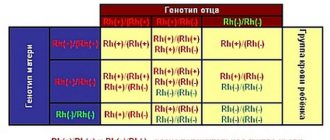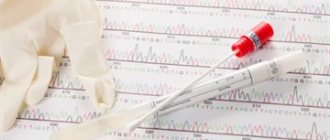Often, clients of our Andromed Medical Center for Andrology and Diagnostics are interested in whether it is possible to establish paternity during pregnancy without waiting for childbirth. In this connection, we dedicate today’s article to this very topic - and we will tell you all the most important things about the analysis to determine the father before the birth of the child.
Let us immediately note that paternity testing during pregnancy is safe and effective. We are talking about non-invasive methods for determining paternity.
By contacting the specialists of our center, you guarantee the reliability of the data received, as well as the maximum level of comfort at all stages of cooperation.
How is a paternity test performed during pregnancy?
To establish paternity during pregnancy, a standard DNA sample from the alleged father and a blood test from the mother are required. As you can see, no specific manipulations are required to conduct a non-invasive test.
The standard biomaterial of the father both before and after the birth of the baby is a smear from the inside of the cheek. Occasionally, other biological materials may be used, such as semen, hair, earwax, etc., but this is the exception rather than the rule.
No preliminary preparation is required from the persons being tested, and therefore the collection for the study takes only a few minutes. There are other advantages to wanting a prenatal (before giving birth) paternity test over a postnatal (after giving birth) test. First of all, after receiving the results, you will no longer have to be nervous, torturing yourself with the question of who is the biological father.
In most cases, under controversial circumstances, expectant mothers note a significant deterioration in their physical and psycho-emotional state, which, in turn, can negatively affect the development of the baby. That is why we always support pregnant women and encourage you to enjoy the pregnancy process!
If you have any doubts, as well as if you have other questions regarding the DNA paternity test before the birth of the child, feel free to ask them to the experienced and attentive staff of the Andromed Center for Andrology and Diagnostics! We will help you determine the baby’s biological father and will do everything in our power to make your pregnancy enjoyable and carefree!
Test result
According to the order of the Ministry of Health and Social Development of the Russian Federation dated May 12, 2010 No. 346 “On approval of the Procedure for organizing and conducting forensic medical examinations in state forensic institutions of the Russian Federation”, paragraph 84.12.6, the level of evidence of an expert study in the case of non-exclusion of paternity and maternity should be the following values:
- for a complete trio (mother - child - putative father), provided that the truth of the other parent is considered indisputable - not less than 99.90%;
- for a duet (child - putative father) in the absence of the other parent - not less than 99.75%.
The results of the study to determine paternity and/or maternity are prepared within 10 days. After this time, after collecting the material, you can receive the results in electronic form.
The test results in the form of a package of documents with a hologram and a blue seal can be obtained 4-5 weeks after collecting the material.
At what stage of pregnancy can paternity be established?
Paternity tests during pregnancy can be performed starting at 8 weeks of pregnancy. This is due to changes in the woman’s body, when already after reaching 8 weeks of pregnancy, by examining the mother’s blood, the DNA of the fetus can be determined by comparing it with the DNA of the child’s alleged father.
The opportunity to do a DNA paternity test during pregnancy helps women make decisions about further personal connections and relationships with men before the birth of the child. In addition, having received the results of the study, you will be able to ensure full protection of the rights of your baby at an early age, as well as freely involve the biological father in the process of preparing for childbirth.
It all depends on specific life situations and circumstances, which resulted in the need to determine paternity. However, regardless of them, we encourage you to choose safety first by choosing non-invasive DNA paternity testing methods.
With concern for you, we suggest establishing paternity during pregnancy, in order to thereby protect ourselves from returning to this issue in the future. The reliability of the results obtained is more than 99.999%, and this is a guarantee of the Andromed Center for Andrology and Diagnostics!
When is paternity establishment necessary?
In our lives, situations arise when it is necessary to establish the degree of relationship, and quite accurately. Such situations may arise, for example, in cases where a will is contested, when a child was born out of wedlock, and the mother wants to independently, at her own request, write down the child’s biological father as the child’s father, when the family wants to be restored. And a large number of such situations can be described, taking into account modern relations between men and women. In our high-tech age of molecular genetic discoveries, it is possible to establish with a sufficient degree of certainty the degree of kinship between people.
Safety of DNA testing methods during pregnancy
Since we are talking about a non-invasive test to determine the father before the birth of the child, the safety of the method is comparable to a conventional screening blood test. You can be absolutely confident in the information content of the study (subject to the recommendations for the optimal pregnancy period for the analysis) and, of course, in the safety of the DNA test for you and the unborn baby!
Methods and timing of the examination
There are two most common ways of conducting prenatal genetic testing: invasive and non-invasive. Both of these methods make it possible to guarantee an objective result of a paternity test, since they are based on DNA analysis - a universal carrier of unique information about each person. But at the same time, there are certain differences. For a complete understanding, we will consider each of the methods separately.
Invasive method
The invasive method is a traditional and longer practiced method of determining paternity, based on comparison of biological material from the father and the unborn child.
In fact, what is called invasive is not the analysis method, but the method of collecting biological material - it requires direct intervention in the body of a pregnant woman. So, in order to obtain genetic samples of the fetus, the woman being studied will have to undergo:
- amniocentesis - puncture of the amniotic sac and uterus to obtain amniotic fluid;
- Chorionic villus biopsy - a puncture of the abdominal wall and uterus to obtain amniotic fluid.
When deciding on invasive intervention during pregnancy, remember that in 1-3% of cases complications such as termination of pregnancy are possible.
After collecting the required amount of material, the samples are compared using software.
Non-invasive method
Since the invasive method is considered quite dangerous, to ensure the safety of the mother and the unborn baby, a non-invasive method of collecting biological material was developed that does not require intervention in the woman’s body.
Non-invasive prenatal DNA paternity testing is performed on the basis of venous blood taken. Blood sampling can be carried out in any medical institution using a regular syringe, which is why this procedure is considered safer and cheaper. Because of this, it is practiced much more often. The objectivity of the non-invasive method is also beyond doubt.
Timing of the examination
Regardless of the method used, examination of the obtained biological samples and interpretation of the results usually takes no more than 5-7 days. The deadline is 14 days, and only if the study is carried out in a provincial center. Much more interesting is the answer to the question of how long it takes to determine paternity. Here the method used already matters.
Thus, in the case of invasive sampling, the minimum gestational age should be 8-14 weeks for biopsy and 14-20 weeks for amniocentesis. As for non-invasive sampling, it is possible no earlier than 10-16 weeks of pregnancy.
In what cases is a DNA test contraindicated during pregnancy?
A non-invasive DNA paternity test before the birth of a child has no contraindications due to its absolute safety. The only exception is during pregnancy, when at the stage of up to 8 weeks the analysis is uninformative.
If we are talking about an invasive paternity test during pregnancy, which involves obtaining the child’s genetic material by chorionic villus biopsy (through a puncture of the abdominal wall or vagina of the mother), cordocentesis (with a puncture of the umbilical cord vessels), amniocentesis, then there is a risk of complications and quite an extensive list of contraindications.
Among them are uterine bleeding, the presence of adhesions of the pelvic organs, uterine hypertonicity, isthmic-cervical insufficiency, uterine fibroids, infectious and chronic diseases in the acute stage, etc.
We suggest giving preference to non-invasive methods of DNA paternity testing during pregnancy! Make a choice in favor of safety and comfort - make a choice in favor of the Andromed Medical Center for Andrology and Diagnostics!
Non-invasive prenatal DNA test
Genetic Expertise LLC specializes in DNA research. Here you can do informative tests and a full-fledged forensic genetic examination, the results of which will have legal force in all courts in the territory of the Russian Federation.
Terms and cost:
54,000 ₽ 10 days
All prices
To get a consultation
Order a test
Basic questions about non-invasive DNA test
In some cases, it is necessary to confirm exactly who the father of the unborn baby is even before his birth. Modern technologies make it possible to conduct non-invasive prenatal DNA analysis from the seventh week of pregnancy. If you need to do a DNA paternity test before the baby is born, contact our laboratory. We guarantee high accuracy of the result, maintaining the confidentiality of all data and absolute security. In each situation, an individual solution to our clients’ problems is always selected. Together with a paternity test, you can check for genetic diseases and the Rh factor. There are several reasons to do a prenatal DNA test. • If a man doubts his paternity. • If a woman does not know exactly who the father of her unborn baby is. • Relatives of the future parents doubt the paternity of the intended man. • If irrefutable proof of paternity is needed for the court. Our lawyer is ready to provide qualified legal assistance and support if you need to conduct a prenatal DNA test for court. Paternity can be confirmed or refuted during pregnancy in a way that is safe for mother and child by doing a non-invasive DNA test. Unlike invasive research, non-invasive research does not require intervention in the uterine cavity, which reduces all risks to zero. The analysis is carried out using the mother's venous blood. You can take any biomaterials from the father, but the best option would be a buccal smear.
First, you should consult with our specialists and explain the situation (you can anonymously, by phone). We will offer the best solution to your problem. Then you need to collect biomaterial for comparative analysis. A pregnant woman needs venous blood. Any available samples, not just an oral swab, will be suitable as the father’s biomaterial. The cost of researching non-standard materials will be higher. Next, the samples are sent for analysis. Two groups of geneticists conduct the study in parallel, which eliminates all kinds of errors and guarantees 100% accuracy of the result. At the end of the study, a conclusion is made, which you can obtain in any convenient way. Mandatory test participants: the alleged father and the pregnant woman. Additionally: additional putative father, paternal relatives.
You can order a kit for self-collection of biomaterial from your father in our laboratory. The mother's venous blood can be donated at another medical institution and sent to us for testing if it is not possible to personally visit our laboratory.
The analysis is carried out within 10 working days from the date of receipt of the biomaterials to the laboratory. The cost is 54,000 rubles. Since you bypass the mediation stage and contact the genetic laboratory directly, the terms and prices are the most optimal. You can also be sure of the accuracy of the result and maintaining the confidentiality of data. The price may be higher, depending on individual characteristics (DNA extraction from non-standard biomaterial, payment for courier services, calling an employee to your home, etc.). Our consultants will help you calculate the exact cost. Contact us.
Paternity will be confirmed with an accuracy of 99.9% or higher, and refuted with 100% accuracy. High-precision equipment and expert specialists in the field of genetics allow us to guarantee our clients the most accurate results and an individual approach to each patient
Only venous blood is accepted from the mother, from which fragments of fetal DNA can be isolated. The intended father may have a standard oral swab test. If it is not possible to obtain buccal epithelium, then non-standard samples, such as nails, hair with roots, sperm, blood, saliva, etc., are suitable. For more detailed information, please contact our specialists. You can get advice either by visiting the laboratory in person, by phone, or by leaving a request on the website. Our staff will promptly respond to your request.
You will receive an answer as soon as the experts make their conclusion. The results are issued in a closed safe package with an identification number, which can only be opened by the person who ordered the analysis. This guarantees absolute confidentiality of all your data and research results. The answer will contain a clear and understandable conclusion whether the alleged man is the father of the child or not. If a forensic genetic examination was carried out at the initiation of the court, the results are sent directly to the court.
You can if you are going to use the analysis results for personal purposes. If a forensic genetic examination is required, then you will have to go through the procedure of identifying test participants and providing documents.
To get a consultation
ReCAPTCHA anti-spam protection is used. Confidentiality. Terms of Use.
Accuracy of analysis results
Before choosing the optimal method of conducting an examination, it is necessary to take into account the mother’s health status, as well as the percentage of accuracy of the results obtained. In the case of invasive research, DNA analysis is carried out using microarrays on which genetic micromarkers are applied.
A computer program with high accuracy confirms or refutes the coincidence of the child’s markers with the father’s markers, which were isolated from his blood.
The accuracy of the method is more than 99.9%. The analysis takes on average 5-7 working days.
However, it is important to remember that during the process of invasive collection of biological material, the risk of losing the child increases significantly. In non-invasive paternity determination, fetal DNA is isolated in the form of fragments from the mother's blood.
The test's 99.9% probability means that the suspected father has the same genetic markers as the child (compared to thousands of random samples). This analysis method is the safest for the baby and the expectant mother.
A non-invasive test is not performed if one of the parents has had a bone marrow transplant or a blood transfusion earlier than 6 months before the procedure.
Regardless of which method was chosen, it is advisable to notarize the results of the tests performed. The document can be used in the future as official proof of paternity.
When can it be established who the father of a child is: in the early or late stages?
An invasive method of determining paternity involves the penetration of special instruments into the uterine cavity to collect biological material. The objects of study in this case are amniotic fluid, as well as chorionic hairs. Obtaining biomaterial samples depends on the chosen technique.
The procedure is carried out in the following period:
- Chorionic villus biopsy: performed from 9 to 12 weeks of pregnancy;
- amniocentesis: from 14 to 20 weeks;
- cordocentesis: from 18 to 24 weeks.
A non-invasive method of determining paternity is very popular. It is carried out on the basis of the mother's venous blood. This procedure can be carried out starting from the 9th week of pregnancy.
From this period, specialists can already detect Y chromosomes. The optimal period for this is considered to be 16 weeks.










